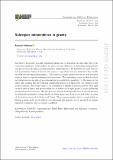Subregion independence in gravity
Author(s)
Folkestad, Åsmund
Download13130_2024_Article_23575.pdf (857.0Kb)
Publisher with Creative Commons License
Publisher with Creative Commons License
Creative Commons Attribution
Terms of use
Metadata
Show full item recordAbstract
In gravity, spacelike separated regions can be dependent on each other due to the constraint equations. In this paper, we give a natural definition of subsystem independence and gravitational dressing of perturbations in classical gravity. We find that extremal surfaces, non-perturbative lumps of matter, and generic trapped surfaces are structures that enable dressing and subregion independence. This leads to a simple intuitive picture for why extremal surfaces tend to separate independent subsystems. The underlying reason is that localized perturbations on one side of an extremal surface contribute negatively to the mass on the other side, making the gravitational constraints behave as if there exist both negative and positive charges. Our results support the consistency of islands in massless gravity, shed light on the Python’s lunch, and provide hints on the nature of the split property in perturbatively quantized general relativity. We also prove a theorem bounding the area of certain surfaces in spherically symmetric asymptotically de Sitter spacetimes from above and below in terms of the horizon areas of de Sitter and Nariai. This theorem implies that it is impossible to deform a single static patch without also deforming the opposite patch, provided we assume spherical symmetry and an energy condition.
Date issued
2024-05-28Department
Massachusetts Institute of Technology. Center for Theoretical Physics; Massachusetts Institute of Technology. Department of PhysicsJournal
Journal of High Energy Physics
Publisher
Springer Science and Business Media LLC
Citation
Folkestad, Å. Subregion independence in gravity. J. High Energ. Phys. 2024, 300 (2024).
Version: Final published version
ISSN
1029-8479